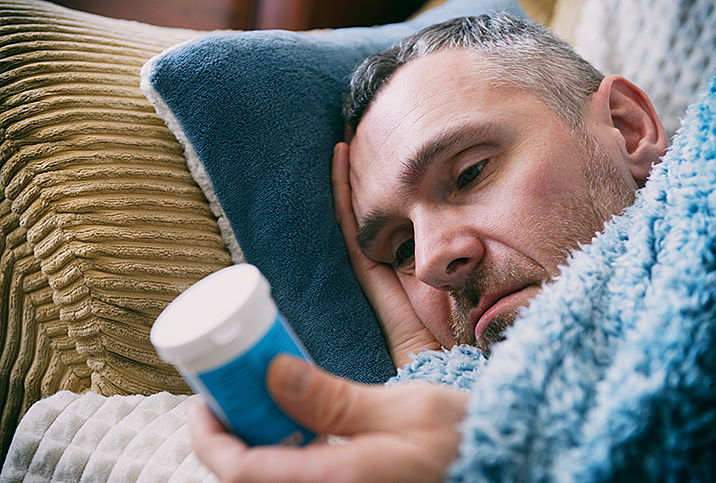A Journey Through a Man's Libido

For many men, their libido is critical to overall sexual health and well-being. A normal, healthy libido is what causes men (and women) to desire sexual activity. When libido drops, so does interest in sex. But is this bound to happen at a given point in a man's life span? Do men lose interest in sex once they hit a certain age?
It's important not to overgeneralize when making statements about the male sex drive because there's much individuality regarding libido and sexuality, according to T. Mike Hsieh, M.D., a professor of urology and the director of the Men's Health Center at the University of California San Diego Health.
"Libido is a very complex thing," Hsieh explained. "Part of it is genetic makeup, part of it is relationships, part of it is hormonal. There's a lot of things at play."
Debunking the 'age limit'
For most men, individual libido level is relatively stable throughout life, according to Britney Blair, Psy.D., a San Francisco–based clinical psychologist and co-founder of the sexual health app Lover.
"We have this misnomer that older adults are asexual, and it's actually not true," Blair said. "It's just that sex has to change."
Hsieh noted that there's no age limit when it comes to your sex drive and having sex.
"I see 80-year-old couples who want help because they're not able to call it quits yet," he said. "Back in the day, we used to have a cutoff. Like if you're over 70, we don't really help people that age with sexual health problems because we figure you're old, that's just normal. Today, people are living longer and they want to age better, and part of aging better is to maintain an active sex life."
A 2010 study in the medical journal The BMJ indicated that 40 percent of men between the ages of 75 and 85 remain sexually active. The study indicated that men tend to retain their sexual appetites longer than women. Of the women between ages 75 and 85 in the study, just 17 percent reported being sexually active.
Similar findings were echoed in a 2008 survey in BJU International of more than 2,000 German men and women ages 18 to 93. Participants across genders found sexual desire declined with advancing age, but the men in the study reported more frequent and stronger sexual desire than women overall.
However, Blair pointed out there is more libido variability within genders than between genders.
"Historically, we thought men always had a higher libido," Blair said. "It's absolutely not the case. Oftentimes, when women suffer from poor libido, it's because they don't like the sex they're having. It's not that they're nonsexual. It's that the sex they're having isn't great."
Factors that cause libido to decrease
Wael Almajed, M.D., a clinical fellow in the department of urology at Tulane University, noted that there are three main categories of factors that impact a man's libido: mental, hormonal and physical.
In the mental category, for instance, might be a man who suffers from depression, anxiety or work burnout, who is more likely to suffer from low libido. Almajed always asks his patients with low libido about the level of stress in their personal and work life.
Relationship conflict can affect a man's libido, as well. One of the issues that both Blair and Hsieh see in their practice is a mismatch of libido, where one partner has a stronger sex drive than the other.
The hormonal factor is primarily related to age. As men age, their testosterone declines, which may cause their sex drive to be affected. Men with low testosterone (low-T) generally have lower libido.
"By restoring a man's testosterone [with testosterone replacement therapy], his sex drive will increase," Hsieh said.
When libido loss stems from a physical cause, Almajed said, maintaining a healthy lifestyle, eating well and exercising can significantly improve the situation.
"People who have a sedentary lifestyle or are overweight tend to have lower testosterone, and subsequently they do suffer from low sexual drive," Almajed said.
Another factor that can cause a man's libido to dip is medications. Antidepressants, for example, have sexual side effects, most commonly decreased libido and erectile dysfunction.
Blair noted that a "lack of novelty" in a man's sexual relationship can also curb libido.
"Getting kind of stuck in the same rut or getting tired of being with your same partner can affect your libido," she said.
Diagnosing low libido
Many of Almajed's patients with low libido have some form of erectile dysfunction (ED)—the two conditions are closely related.
"They tend to coexist, so when we get a patient who has a low sex drive, we tend to screen them for erectile dysfunction and the quality of their erections," Almajed said. "Our approach is to see what's causing the low sexual drive, and once we find a factor, we can work on it and generally improve it whenever we target our treatment toward that specific cause."
Blair noted that if men live long enough, they will likely experience ED at some point.
"ED affects 50 percent of men in their 50s, 60 percent of men in their 60s, 70 percent of men in their 70s," Blair explained. "It's basically an inevitability."
This is why Blair encourages her patients to expand their sexual repertoire beyond intercourse and activities that require an erect penis.
"Every man should expect libido fluctuations throughout their life, not just when they get older," Hsieh said. "When you go from your 20s to 30s, most people feel pretty much the same, but 30 to 40 you feel a drop-off, 40 to 50 you feel a drop-off, 50 to 60 you feel a drop-off."
'Don't ignore the warning signs your body is trying to tell you, because something like erectile dysfunction could be a risk factor for future cardiovascular disease.'
While this is normal, you shouldn't ignore fluctuations, because a low sex drive could signal other issues, such as reduced hormone levels or sexual dysfunction.
"Men need to be in tune with their bodies and seek help, because it's hard for a man to decide what's normal and what's not normal," Hsieh explained. "Don't ignore the warning signs your body is trying to tell you, because something like erectile dysfunction could be a risk factor for future cardiovascular disease."
Hsieh also believes that physical exam findings for libido are not generally very helpful, making a patient's own observations all the more critical.
"Unfortunately, there's not really a physical exam finding for loss of sex drive," he said. "A lot of it is really history-taking. Somebody who is widowed and not ready to move on versus a 50-year-old guy with a 20-year-old second wife, it's very different."
Hsieh noted that taking a look at the history of what's going on in the man's life is how he gets the best idea of how much of the low libido is psychological versus physical or hormonal.
Hitting your sexual peak
Libido in men tends to peak in the 20s and 30s, and maybe even the late teens. This is related to testosterone level, which peaks when reaching adulthood and gradually declines with age. Sexual desire tends to decline with it.
Women, on the other hand, typically hit their reported sexual peak in their 30s and early 40s.
"We think that's more because women, as they age, have more body confidence and are having better sex," Blair said. "Our genitals are already inside of our body. It's not a given to do this or that and I have an orgasm. Whereas, with men, they learn from an early age how to touch their penis and experience pleasure and orgasm."
However, Blair noted that the fact that many men hit their sexual peak in their teens and 20s does not necessarily mean their libido is highest then. Part of the reason that the teens and 20s are considered the peak is that it's when men have a rapid refractory period—the time after an orgasm when a man is not sexually responsive.
"Over time, the length of that [refractory period] increases and the odds that you may experience ED increases," Blair explained.
In general, with men who are considered to be highly sexual—such as those who masturbate multiple times a day or who have sex frequently with multiple partners—sex drive is going to be relatively stable throughout their life span.
Blair pointed out that this does not consider certain factors, such as the possible "boring nature of long-term monogamy and relationship problems."
"Those have such a big impact and are more likely to happen as time goes on with your same partner," she said.
Some advice for men with low libido
If you're a man distressed by your low libido, Blair advises you to seek professional help. She noted that a common myth regarding libido is that it's best if you wait until you're in the mood for sex, when in fact it's sometimes the opposite. The old saying, "If you don't use it, you lose it," rings true for libido.
"When patients tell me they don't want to have sex, literally I tell them, 'Have sex.' Put it on a schedule," she said. "The more you have sex, the more you want it. Don't wait until you want it."
Blair emphasizes that it's normal for the initial spontaneous, lusty libido to dissipate over time and be replaced with "responsive desire," or interest in sex that happens in reaction to sexual stimuli.
In other words, once you get aroused, your libido will increase.
"You'll have this, 'Don't mind if I do' kind of thing," Blair said. "And then, you're off to races. That's the biggest piece of advice that I give to people about sex generally. Just plan for pleasure on a really regular basis, and you'll find that your body wants it."




















